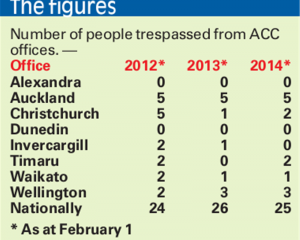ACC claimant support group Acclaim Otago plans to raise its growing concerns about access to justice issues at a United Nations committee hearing in Switzerland next month.
New Zealand's compliance with the Convention on the Rights of Persons with Disabilities is being reviewed by a United Nations committee, which has oversight of convention matters.
Former Acclaim Otago president and Dunedin ACC campaigner Denise Powell, as well as Warren Forster and Tom Barraclough, will travel to Geneva, Switzerland, next month.
They will make submissions when New Zealand's compliance with the convention is considered on September 15-16.
Dr Powell said recent Government proposals to do away with the system of ACC claimant appeals being heard in district courts in favour of a specialised ACC Appeals Tribunal would be ''grossly unfair''.
Acclaim Otago had changed its draft submission to the United Nations to take issue with the appeals tribunal proposal.
ACC appeals could involve hundreds of thousands of dollars, and concerned crucial issues involving support for seriously injured people.
Such issues were more properly dealt with by a court than by tribunals, she said.
There was potential scope for some form of tribunal to take over the hearing of lower-level ''reviews'' of ACC cases, but it was important to retain a key role for the district court.
Court judges were more independent than tribunal members, and had also built up a wealth of knowledge on ACC law, which was highly complex.
Tribunal members would not have that level of detailed knowledge, she said.
Messrs Forster and Barraclough are the main authors of the Acclaim Otago submission to the UN, which was supported by a New Zealand Law Foundation Shadow Report Award, amounting to $8550.
Approached for comment, Courts Minister Chester Borrows said tribunal members were judicial officers who resolved disputes and cases across the Ministry of Justice's 28 tribunals. Appointed members had ''appropriate skills and experience'' to deal with the particular matters involved.
He had found them ''thoroughly professional'', and ''absolutely capable'' and tribunal members were part of the country's ''independent judiciary''.
Concerns that using a specialist tribunal would result in a lower standard of service or independence were ''completely unfounded''.
ACC Appeals Tribunal members would be lawyers with at least seven years' experience, and it was appropriate for the chairman to be a sitting or recently retired district judge.
The new tribunal had been designed to ''significantly reduce the unacceptable time it takes to get an ACC appeal resolved'', which averaged nearly 700 days.
Such changes did not alter the ''substantive rights or law being applied, and will not alter the outcome of cases'', he said.
Advertisement







